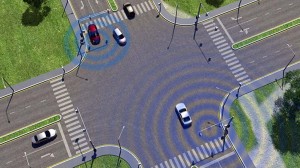New federal rules will require automakers to equip all of their vehicles with so-called “black boxes” that track the way a motorist is driving and can provide investigators a clue to the cause of a crash. The downside is that such data could also be used as evidence against a driver accused of breaking the law.
But that’s just the beginning of a high-tech revolution on wheels that raises even more serious concerns about the trade-off between safety and personal privacy.
The Michigan Department of Transportation this week announced plans to create a vehicle-to-infrastructure communications network along 120 miles of Detroit-area highways, while Cadillac said it will begin equipping its CTS model with a vehicle-to-vehicle communications system by 2017. The federal government has signaled it may soon mandate these V2I and V2V technologies across the country and on all new cars.
The goal is to create a network of “smart,” connected vehicles that are always aware of potential problems, whether a crash, a traffic tie-up or weather-related issues. During this week’s Intelligent Transportation Systems, or ITS, conference in Detroit, 10,000 industry leaders were told how this technology could make freeways run more smoothly and, according to National Highway Traffic Safety Administration Administrator David Friedman, save “thousands of lives” annually.
(Click Here for more on Cadillac’s plans to launch a semi-autonomous sedan.)
But skeptics are becoming increasingly concerned about whether motorists will have to give up privacy and personal data in the process.
“It’s not just general data, how many people shop at this store. They know it’s you, they know where every single person went and what they did,” New York Sen. Charles Schumer said earlier this year. “Cars are ‘smarter’ than they have ever been, and they will only continue to get smarter as technology continues to evolve at a rapid pace. Cars are now able to track where we shop, where we eat and where we go on family vacations, but drivers should be able to go about their daily lives without being tracked.”
There’s already a growing flap about the use of license plate readers that can track any vehicle passing by a fixed or mobile camera system. And the Washington Post this month disclosed the existence of a controversial police network that has been used to keep an eye on motorists “of interest” to authorities as they travel around the country.
The potential is clearly there for the new smart car technologies to provide much more detailed information, though industry experts say that is not the goal, nor the plan.
In most cases, “We don’t need personalized data,” said Ralf Lenniger, senior vice president, interior electronic solutions for Continental Automotive. “If cars are crossing a route, it’s not important who’s in the car, it’s important what’s across the street.”
(For more on the ITS conference and tomorrow’s smart cars, Click Here.)
Smart car proponents contend that what they’re looking for is information about driving conditions, such as the speed and density of traffic, as well as such weather issues as ice or fog. That could be used to warn motorists to divert to alternate routes, for example. And once autonomous vehicles start to take to the highways, it might allow them to travel in tightly-grouped packs to squeeze more vehicles onto today’s overcrowded roads.
But there could be significant pressure to gather more information. Law enforcement authorities would be happy to be able to simply query a vehicle to see if the driver was speeding, or ran a red light, rather than having to catch them in the act.
At the other extreme, marketers are salivating at the idea of being able to reach motorists on the go with targeted ads, much like those Google and others deliver to computer screens. Stop at a Starbucks every morning and suddenly you discover a virtual coupon displayed on your navi screen as you head to work in the morning.
But an even bigger concern is whether hackers might take an interest in your personal data, just as they have gone after what’s on personal computers, and in the servers run by retailers such as Target and Home Depot.
“It’s a relatively low risk today,” Karl Heimer, the senior research director at the Battelle Center for Advanced Vehicle Environments, told TheDetroitBureau.com during a recent interview. But he warned that it won’t be for long. The more smart cars on the road, the more information they offer, the more appealing a target they become. That message is gaining traction.
“The time is now: We need to make sure we move forward aggressively on cybersecurity,” NHTSA Administrator Friedman said during a speech at the ITS conference.
(Mobile security experts race to outgun highway hackers. Click Here for the story.)
While Friedman said no car has yet been successfully hacked, researchers have shown it is possible, one team recently accessing the underlying software used by the high-tech Tesla Model S. Another university group was able to crack the code for a vehicle’s remote keyless entry system.
So, even if authorities decide to put personal data off-limits in tomorrow’s cars, the fear is that hackers won’t be so respectful of privacy.

